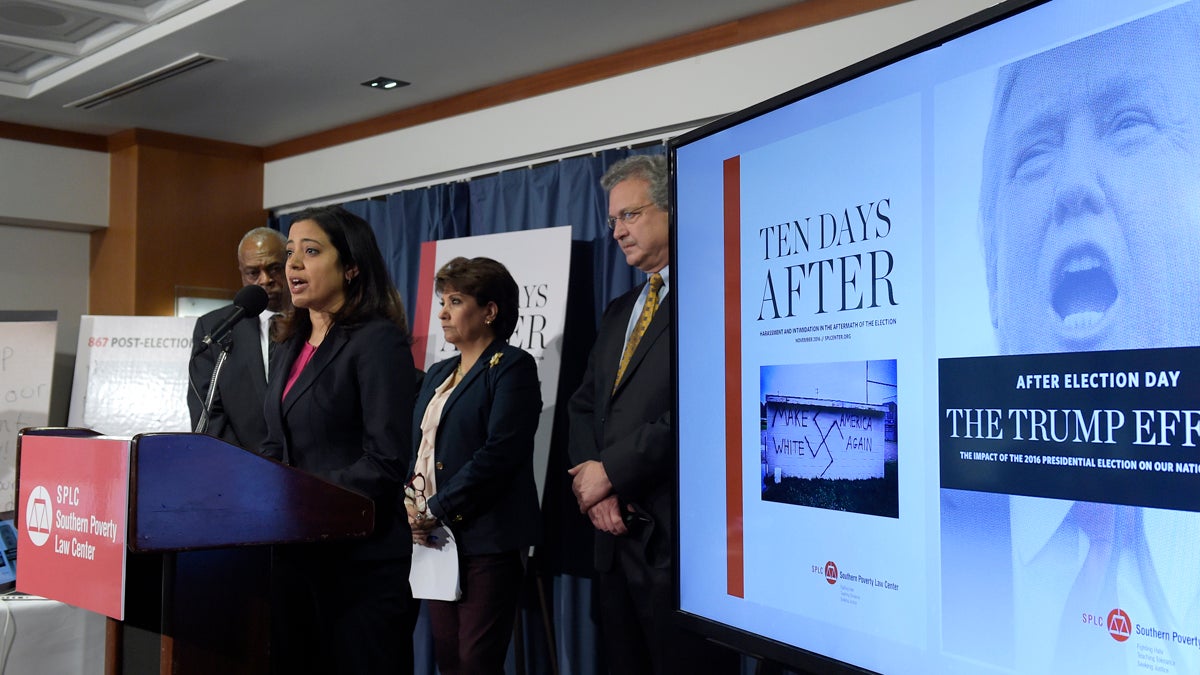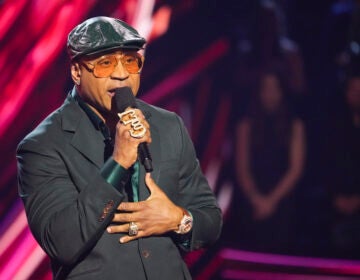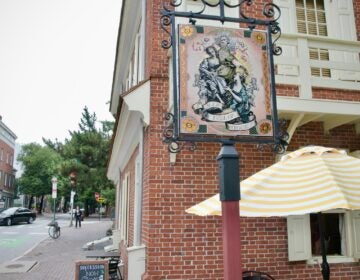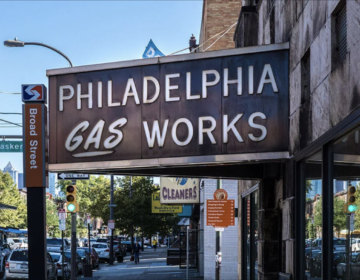Since November election, rate of hate crime reports rising in Philly
Listen
Brenda Abdelall, with Muslim Advocates, (second from left), speaks during a news conference at the National Press Club in Washington, Tuesday, Nov. 29, 2016. Abdelall, standing with (from left), Wade Henderson, President and CEO of The Leadership Conference on Civil and Human Rights, Janet Murguia, the President and CEO of the National Council of La Raza, and Richard Cohen, president of the Southern Poverty Law Center, called on President-elect Donald Trump to publicly denounce racism and bigotry. (Susan Walsh/AP Photo)
Reports of hate crimes and bias incidents in Philadelphia have risen sharply since the presidential election, according to Philadelphia’s Commission on Human Relations.
From the election to this month, the commission has received 38 reports of bias and hate crimes citywide, well more than what is usually reported over a 12-month stretch.
“That is a strong increase from years past. We’ve never seen a few months like this,” said Rue Landau, commission executive director.
Is it attributable to the commission’s growing visibility? Or are people feeling emboldened by what some see as President-elect Trump’s hateful rhetoric?
Landau said she doesn’t know for sure. But, she said, Trump’s disparaging comments about Muslims, Mexicans and other historically marginalized groups have definitely fueled some of the acts.
“We have just listened to someone on the national stage who believes that you can say and do anything you want to say or do, even if it’s hateful,” Landau said. “The truth is, most of the people who are going to be in the White House very soon are never, ever going to deal with the consequences of these negative acts and hateful speech. And we on the ground know that’s different.”
There have been incidents of swastikas, more instances of anti-gay and anti-Semitic speech, and an increase in targeting Muslims, such as the report of someone pulling off a woman’s hijab.
“One bias incident in a neighborhood, even if it doesn’t rise to the level of a crime, puts fear in the lives of the victims, and the entire community,” Landau said.
Nationwide, the Southern Poverty Law Center has documented a spike in anti-Muslim incidents following the presidential election, but the civil rights advocacy group now says the number has started to decline.
In Philadelphia, whether the increase in reports of hateful acts represents a short-term blip — or if it’s just the start of a longer-term pattern — remains to be seen.
“What we also know is that one small act, you don’t know if that’s the last one. Is going to be larger? Is it going to be bigger? Is it going to be more violent?” Landau said. “And that is what people are worried about.”
In another example, Landau said someone in South Philly installed a sign on their door calling their neighbor an illegal immigrant with arrows pointing to that home.
“It just so happens that the neighbors were not undocumented,” she said. “But still, just this kind of feeling like they had the license to do this, to cause this harm to their neighbors, is significant.”
The commission tries to solve community disputes before they become violent by bringing different groups together for dialogue, said Landau, who has gathered police officers and young people of color and united members of Philadelphia’s African-American communities and African immigrants.
“When people get to know each other as people and as individuals — and stop painting each other with a wide brush, making a generalizations about groups — that we reduce hate, reduce community tension,” she said.
The commission also has an anonymous tip line — 215-286-2856 — and the calls have been piling up.
“People are definitely utilizing it,” she said. “If you come to us, we are very resourceful.”
WHYY is your source for fact-based, in-depth journalism and information. As a nonprofit organization, we rely on financial support from readers like you. Please give today.




